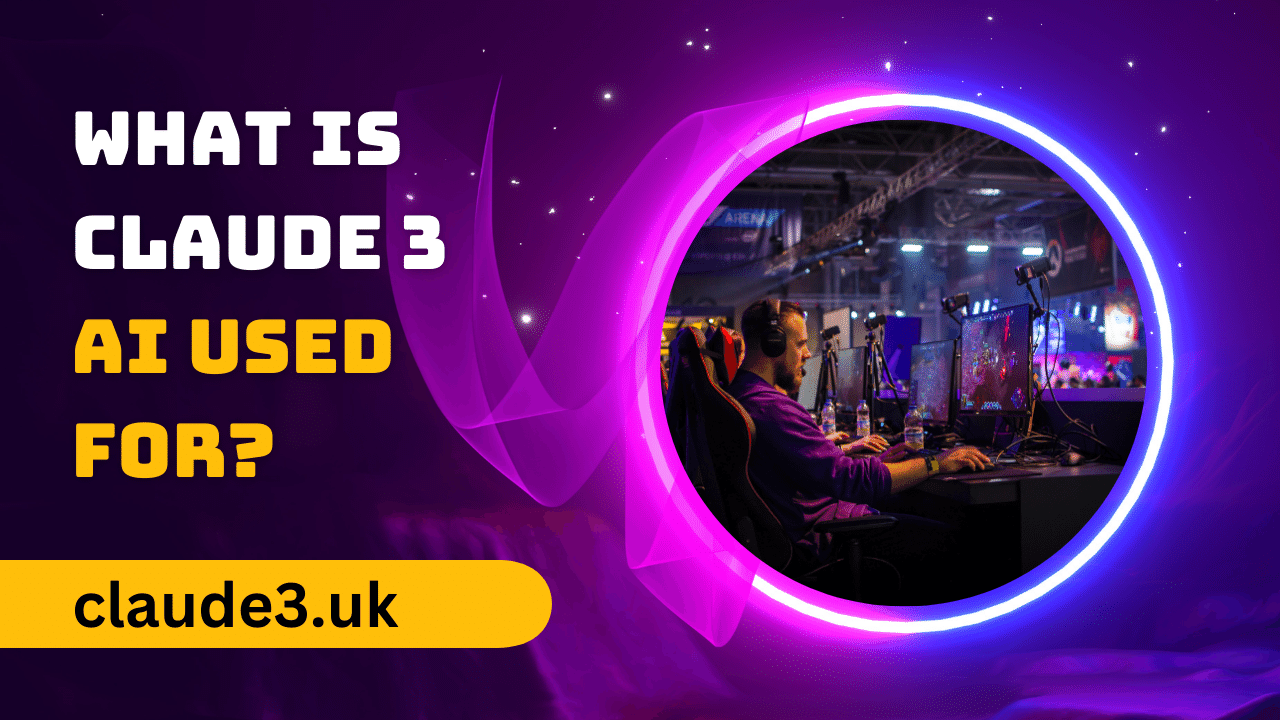Artificial Intelligence (AI) has rapidly transformed various industries, offering innovative solutions to complex problems and enhancing operational efficiency. Claude 3 AI, developed by Anthropic, is at the forefront of this evolution, equipped with advanced capabilities that cater to a wide range of applications across different sectors. This article explores the diverse uses and applications of Claude 3 AI, examining its functionalities, benefits, challenges, and future prospects.
Introduction
Claude 3 AI represents a significant advancement in AI technology, integrating sophisticated algorithms and machine learning models to tackle intricate tasks in diverse domains. Named after Claude Shannon, a pioneer in information theory, Claude 3 AI embodies versatility, scalability, and ethical AI principles. This section provides an overview of Claude 3 AI’s foundational principles and its role in driving innovation across industries.
Key Features
Understanding the key features of Claude 3 AI is essential to comprehend its utility and application in various business contexts. This section delves into the core functionalities that distinguish Claude 3 AI, including:
1. Natural Language Processing (NLP)
AI excels in NLP, enabling it to understand, interpret, and generate human language with a high degree of accuracy. NLP capabilities empower Claude 3 AI to perform tasks such as sentiment analysis, chatbot interactions, language translation, and content generation. Businesses leverage NLP to enhance customer service, automate communication processes, and derive actionable insights from textual data.
2. Machine Learning (ML) Capabilities
At the heart of Claude 3 AI lies its robust ML capabilities, which facilitate predictive analytics, pattern recognition, and data-driven decision-making. The AI learns from large datasets to make informed predictions, optimize processes, and identify opportunities for improvement. Applications of ML in AI include personalized recommendations, predictive maintenance, fraud detection, and risk management across diverse industry sectors.
3. Data Integration and Processing
AI supports seamless integration with heterogeneous data sources, including structured and unstructured data. The AI analyzes vast amounts of information in real-time, extracting valuable insights and trends that inform strategic decisions. Data integration capabilities enable Claude 3 AI to enhance operational efficiency, improve resource allocation, and drive innovation through data-driven insights.
4. Automation and Workflow Optimization
Automation is a cornerstone of Claude 3 AI, streamlining repetitive tasks, minimizing human error, and optimizing operational workflows. The AI automates processes such as data entry, report generation, customer service inquiries, and supply chain management, thereby freeing up human resources for more strategic initiatives. Automation capabilities enhance productivity, reduce operational costs, and accelerate business processes in dynamic and competitive environments.
5. Scalability and Customizability
Claude AI offers scalability to meet varying business needs, from startups to large enterprises. The AI’s modular architecture supports customization, allowing businesses to tailor solutions that address specific challenges and objectives. Whether deployed for customer relationship management, financial analysis, healthcare diagnostics, or industrial automation, Claude 3 AI adapts to industry-specific requirements, integrating seamlessly with existing IT infrastructure and enhancing organizational capabilities.
Applications of Claude 3 AI Across Industries
The versatility of Claude AI extends across diverse industries, revolutionizing business operations and driving innovation. This section explores real-world applications and case studies that illustrate how Claude 3 AI is utilized in sectors such as:
1. Healthcare and Medical Diagnostics
In healthcare, Claude AI enhances diagnostic accuracy, patient care, and operational efficiency. The AI analyzes medical imaging data, patient records, and clinical notes to assist healthcare professionals in making informed decisions. Applications include disease diagnosis, treatment planning, medical imaging analysis, and personalized medicine, improving healthcare outcomes and patient satisfaction.
2. Finance and Banking
Financial institutions leverage Claude 3 AI for risk management, fraud detection, and personalized banking services. The AI analyzes transaction data, market trends, and customer behavior to identify anomalies, predict market movements, and offer tailored financial advice. Claude 3 AI enhances regulatory compliance, operational resilience, and customer engagement in the banking sector, fostering trust and efficiency.
3. Retail and E-commerce
In retail, Claude AI transforms customer experiences through personalized recommendations, demand forecasting, and inventory management. The AI analyzes consumer behavior, purchase history, and market trends to optimize pricing strategies, enhance product recommendations, and improve supply chain logistics. By delivering personalized shopping experiences and targeted marketing campaigns, Claude 3 AI drives sales growth, customer loyalty, and competitive advantage in the retail industry.
4. Manufacturing and Industrial Automation
Manufacturers deploy AI for predictive maintenance, quality control, and supply chain optimization. The AI monitors equipment performance, analyzes sensor data, and predicts maintenance needs to minimize downtime and enhance operational efficiency. Applications include production planning, inventory optimization, smart logistics, and predictive analytics, enabling manufacturers to improve product quality, reduce costs, and maintain competitiveness in global markets.
5. Marketing and Customer Engagement
In marketing, Claude AI revolutionizes customer engagement through data-driven insights, campaign optimization, and customer sentiment analysis. The AI analyzes consumer data, social media interactions, and market trends to create targeted marketing strategies, optimize advertising spend, and maximize ROI. Claude AI enhances customer segmentation, personalized messaging, and omnichannel marketing efforts, enabling businesses to attract, retain, and nurture customer relationships effectively.
Benefits of Using Claude 3 AI
The adoption of Claude 3 AI offers numerous benefits for businesses seeking to innovate, optimize operations, and gain a competitive edge. This section explores the overarching benefits derived from leveraging Claude 3 AI across organizational functions and strategic initiatives:
1. Enhanced Operational Efficiency and Productivity
Claude AI automates repetitive tasks, streamlines workflows, and optimizes resource allocation, thereby enhancing operational efficiency and productivity. By reducing manual errors and accelerating business processes, the AI enables businesses to focus on strategic initiatives and core competencies that drive growth and innovation.
2. Data-Driven Decision-Making and Strategic Insights
Claude AI empowers businesses to make data-driven decisions by analyzing large datasets, identifying patterns, and predicting outcomes. The AI provides actionable insights into market trends, customer preferences, and operational performance, enabling informed strategic decisions that align with business goals and optimize outcomes.
3. Improved Customer Experience and Engagement
Through personalized interactions, proactive customer service, and targeted marketing efforts, Claude 3 AI enhances the overall customer experience and fosters customer loyalty. The AI delivers personalized recommendations, resolves inquiries promptly, and anticipates customer needs, thereby increasing satisfaction and retention rates.
4. Cost Reduction and Operational Optimization
Claude 3 AI helps businesses reduce operational costs, minimize waste, and optimize resource utilization through automation and predictive analytics. By identifying inefficiencies, optimizing supply chain logistics, and predicting maintenance requirements, the AI enhances cost-effectiveness and operational efficiency across various business functions.
5. Competitive Advantage and Market Differentiation
By leveraging Claude 3 AI’s advanced capabilities, businesses can gain a competitive edge and differentiate themselves in the marketplace. The AI facilitates innovation, agility, and responsiveness to customer needs, enabling businesses to launch new products, enter new markets, and capitalize on emerging opportunities.
Challenges and Considerations in Claude 3 AI Adoption
Despite its transformative potential, the adoption of Claude 3 AI presents challenges and considerations that businesses must address to ensure successful implementation and ethical deployment:
1. Data Privacy and Security
Protecting sensitive data and ensuring compliance with regulatory requirements are critical considerations in Claude 3 AI adoption. Businesses must implement robust data security measures, encryption protocols, and access controls to safeguard confidential information from unauthorized access or breaches.
2. Integration with Existing Systems and Workflows
Integrating Claude 3 AI with existing IT infrastructure and operational workflows requires careful planning and expertise. Businesses must assess compatibility, address interoperability challenges, and ensure seamless integration of AI technologies with legacy systems.
3. Ethical and Regulatory Compliance
Ethical considerations such as bias mitigation, algorithmic transparency, and accountability in AI decision-making are essential in Claude 3 AI adoption. Businesses must adhere to ethical AI principles, adopt fairness and equity guidelines, and promote responsible AI governance frameworks to build trust and mitigate risks.
4. Change Management and Workforce Readiness
The adoption of Claude 3 AI necessitates organizational change and workforce readiness to maximize its potential and mitigate resistance to technological advancements. Businesses must invest in employee training programs, upskill workforce competencies in AI literacy and data analytics, and foster a culture of continuous learning and innovation.

Future Trends and Developments in Claude 3 AI
Looking ahead, Claude 3 AI is poised to evolve further, driven by advancements in technology, evolving business needs, and regulatory developments:
1. Augmented Intelligence and Human-Machine Collaboration
The future of Claude 3 AI lies in augmented intelligence, where AI technologies augment human capabilities rather than replacing them. By enhancing cognitive abilities, decision-making processes, and creativity, Claude 3 AI enables human-machine collaboration that fosters innovation, productivity, and problem-solving in diverse industry sectors.
2. Interdisciplinary Applications and Cross-Industry Integration
Claude 3 AI’s integration with emerging technologies such as blockchain, Internet of Things (IoT), and quantum computing opens new avenues for interdisciplinary applications and cross-industry integration. From smart cities and autonomous vehicles to precision agriculture and personalized healthcare, the AI facilitates collaborative innovation, ecosystem connectivity, and data-driven decision-making across interconnected sectors.
3. AI-Driven Sustainability and Ethical AI Governance
As businesses prioritize sustainability goals and corporate responsibility initiatives, Claude AI plays a pivotal role in driving AI-driven sustainability and ethical AI governance. By analyzing environmental data, optimizing resource consumption, and promoting ethical supply chain practices, the AI enables businesses to achieve sustainable development goals
and enhance brand reputation. Claude 3 AI’s commitment to ethical AI governance, transparency, and accountability ensures responsible AI deployment that balances economic prosperity with social equity and environmental stewardship, contributing to a sustainable future for generations to come.
4. Regulatory Advancements and Policy Frameworks
The evolution of Claude 3 AI is shaped by regulatory advancements and policy frameworks that govern AI adoption, ethics, and accountability. Governments, regulatory authorities, and international organizations are developing guidelines, standards, and compliance frameworks to ensure ethical AI deployment, protect consumer rights, and mitigate risks associated with AI technologies. By engaging in collaborative dialogue, sharing best practices, and advocating for responsible AI policies, businesses can navigate regulatory complexities, uphold ethical standards, and foster public trust in AI-driven innovations that promote inclusive growth and societal well-being.
Conclusion
Claude 3 AI represents a transformative force in the realm of artificial intelligence, empowering businesses to innovate, optimize operations, and achieve sustainable growth in an increasingly digital and interconnected world.
By harnessing advanced technologies such as natural language processing, machine learning, and predictive analytics, Claude 3 AI enables businesses to make data-driven decisions, enhance customer experiences, and differentiate themselves in competitive markets.
However, the adoption of Claude 3 AI requires careful consideration of challenges such as data privacy, ethical implications, and workforce readiness, alongside opportunities for innovation, collaboration, and regulatory compliance.
As Claude 3 AI continues to evolve and expand its applications, businesses must embrace responsible AI practices, leverage interdisciplinary insights, and prioritize ethical considerations to unlock its full potential and drive positive societal impact.
FAQs
What is Claude 3 AI used for?
Claude 3 AI is used for healthcare diagnostics, financial analysis, retail personalization, manufacturing optimization, and customer service automation.
How does Claude 3 AI benefit businesses?
It enhances efficiency, automates tasks, provides data-driven insights, and improves decision-making, leading to increased productivity and cost savings.
In which industries is Claude 3 AI commonly applied?
Industries include healthcare, finance, retail, manufacturing, and marketing.
What are the key features of Claude 3 AI?
Features include natural language processing (NLP), machine learning, data integration, task automation, and scalability.
How does Claude 3 AI contribute to sustainability and ethical AI practices?
It optimizes resource use, reduces waste, and adheres to ethical principles like fairness, transparency, and accountability.
What are the challenges in adopting Claude 3 AI?
Challenges include data privacy, system integration, ethical considerations, regulatory compliance, and workforce readiness.
What are some real-world examples of Claude 3 AI applications?
Examples include healthcare diagnostics, financial advisory services, retail recommendations, predictive maintenance, and customer service chatbots.
